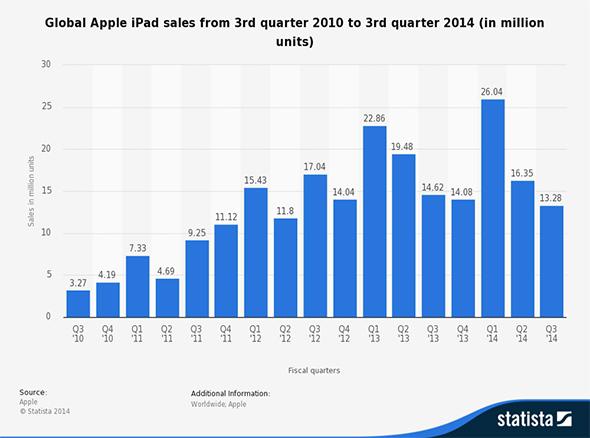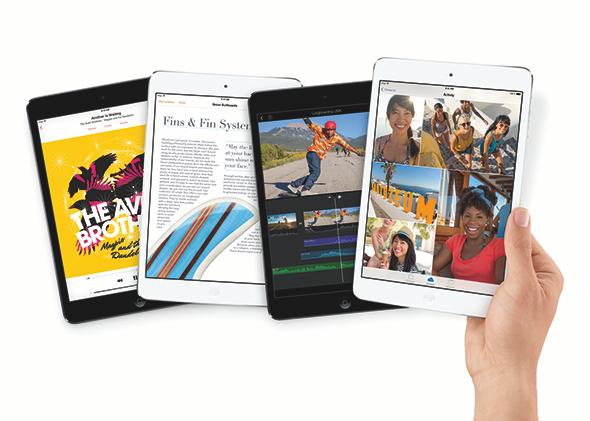The numbers are clear: Apple is selling fewer iPads.
The company reported on Tuesday that sales of its sleek, pricey tablet were down 19 percent from last quarter and 9 percent year-over-year. CEO Tim Cook tried to reassure investors that Apple’s new partnership with IBM to sell its devices to IBM’s corporate customers will help make iPads ubiquitous in the workplace. “This isn’t something that worries us,” he said of the iPad sales decline. But the numbers are disappointing no matter how you spin them.
This was supposed to be the iPad’s time to shine. Greeted with skepticism when Steve Jobs announced it in 2010, the tablet shattered expectations and upended the computer industry. As sales figures grew, pundits began predicting the death of the PC.
Instead, PC sales appear to be stabilizing—Mac sales are actually growing—and it’s the iPad whose sales are declining. The trend is undeniable, as you can see in the chart below by the business statistics portal Statista.

Courtesy of Statista
Is it possible that, at the tender age of 4, the iPad has already passed its peak? Should we brace ourselves for the post-PC crowd to begin proclaiming the death of the tablet?
Not so fast. The truth is that the iPad was never cut out to replace the PC, so we shouldn’t be surprised that it hasn’t. And, just as the “death of the PC” narrative has been oversold, it’s way too early to write off the tablet’s future. It’s simply time to adjust expectations.
The iPad’s sales woes don’t mean it’s a bad product. Apple customers consistently report satisfaction with their tablets, and the iPad continues to command a dominant share of the market in the face of intensifying competition from Samsung, Microsoft, Amazon, and others.
But there are inherent limitations to the device’s ubiquity. As great as it is for watching movies on an airplane or checking email over breakfast, it still can’t match the power and versatility of a desktop or laptop as a primary workstation. Microsoft is trying to solve that problem with its business-oriented Surface Pro tablets, with mixed results; Apple, at least until the IBM deal, wasn’t even trying.
For most people, these limitations consign the iPad to “third device” status behind the smartphone and the PC. And it shouldn’t be surprising that not everyone needs or can afford a third device—especially one as dear as Apple’s. Again, though, this isn’t just an Apple problem: The majority of Americans still don’t own a tablet.
The second big problem for Apple’s tablet sales might be, ironically, the same factor that’s holding back sales of PCs: They’re too durable.
At the height of the “death of the PC” hand-wringing, I argued that PCs weren’t dying, but rather living longer. That is, the drop-off in sales reflected a decline in PCs’ replacement rate—the time between the average consumer’s computer purchases. Not only are there more gadgets competing for your money, but PCs have gotten so fast and reliable that you don’t need to buy a new one that often.
I haven’t seen hard data on the replacement rate for iPads, but I’d bet that similar forces are at work. Tim Cook said Tuesday that more than 50 percent of iPad buyers are first-time tablet owners. That sounds on its face like good news for the device’s future. Given that sales are declining overall, however, it also suggests that the company has yet to see a huge wave of repeat customers. A lot of people are probably still perfectly happy with their second- and third-generation iPads, even as Apple is preparing to launch its sixth.
And that’s the way it ought to be. It’s not fair for consumers to drop hundreds of dollars on a fancy gadget only to see it become obsolete within two or three years. It sure is good for business, though—and no one knows that better than Apple. Just look at the iPhone, which keeps breaking its own sales records even after seven years on the market.
That’s partly because of the odd arrangement by which U.S. wireless carriers heavily subsidize new smartphone purchases every two years in order to lock customers into their data plans. But it’s also because iPhones just don’t work that well after two years. Their processors begin to feel sluggish. Their battery life flags. And their screens shatter. I’m convinced there are millions of people out there who would happily buy a new tablet if only they didn’t have to spend hundreds of dollars replacing their phones all the time.
The disparity between iPhone and iPad sales might only widen if the company releases a larger, 5.5-inch iPhone this fall, as has been widely rumored. That’s still significantly smaller than the 7.9-inch iPad Mini. But the iPhone makes calls, and your carrier will help pay for it.
Apple is also presumably readying its usual slate of fresh features for its sixth-generation iPads. But if the company really wants to see its tablet sales spike, maybe it should forget about A8 processors and 8-megapixel cameras. Just find a way to get people to drop their iPads on the ground more often.
